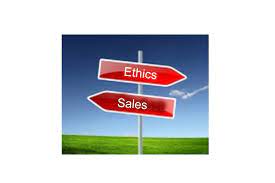
Ethical sales: What are they and why they are important
Sales have always been a complicated process. To talk a client into buying your product or solution above your competitors is not easy, especially if your product is not the best fit for the client. In these cases, some companies are tempted to use unethical practices to make sales, based on the commonplace that “business is business”. Although many businessmen think that, the only way to keep long-lasting relations with your customers is through ethical sales. In this article, I will address the importance of ethical sales and how to react to unethical practices.
What are ethical sales?
Ethical sales are those sales processes conducted with transparent, accurate, and truthful information to the client and always thinking of providing the best solution to them. An organization that thinks that “sales must be closed no matter what”, is bound to engage in the use of unethical practices.
Importance of ethical sales
Although ethical sales seem a straightforward principle, in reality, it is not always easy to live by it. Firstly because ethics is a relative concept; it depends on the culture of the country and the uprising of the person. But secondly, surviving in this time of the pandemic, inflation and loose morals is very hard, especially if you are a small to medium business. Hence, the temptation to twist the truth a little with your customers is very strong.
If this is happening in your business, you must remind your sales reps of the importance of staying loyal and true to your customer; and that the only way to keep long-lasting sales with your customers is through a trustful relationship with them. This is especially true for distributors, where sales are carried out on a regular basis and brand image is tied to the performance and delivery of the distributor.
Common practices in ethical sales and how to respond
There are many unethical practices or directives that an organization can have to ensure sales “no matter what”. We will focus on the most common that we have found in the distribution sector.
Lack of transparency. This is the most common practice that we have found since there is a lot of information that a customer needs in order to make a purchase decision.
- It may be an omission, such as not providing relevant information. This is within the bounds of ethical behavior because the sales rep strictly does not provide false information.
- A sales rep can provide misleading information on critical issues that are important for the decision, as features. This is very common in the software industry.
- Lying about relevant issues to the purchase decision.
Rather than saying that the competitor provided wrong information, the best ethical way to counter a lost sale due to a lack of transparency from the competition is to clearly state the benefits of your products versus the competition. By doing so, you will be implicitly laying out the wrong data provided by the competitor and leaving it to the buyer to infer it.
Providing unknown references. Sometimes the Sales Rep gives a fake example of happy customers to lure the buyer into purchasing your products. Never do that! Eventually, the truth will come out and you will end up losing the client and earning yourself and your company a bad reputation.
Downgrade the competitors based on rumors or fictitious data. If you find yourself in this situation do not waste energy trying to deny it; rather state the facts of your company and provide references that show your honesty and commitment.
Over sale of products. This is a typical practice of unethical sales reps who are about to quit. It consists of selling more than you know the store can sell in a period. The result will be products returned by the store at a loss for the company and an annoyed customer. Since the sales rep will not be there when that happens he does not lose. The best way to counteract this practice is to include provisions in your sales rep’s contract stating that the final commission will be paid a number of days after the contract ends.
Sale of products with near expiration date without notifying the client. This is also common practice for a sales rep about to leave the company.
Bribing. Although the word has a negative connotation, it also has a wide degree. At one extreme, it can be simple gifts, but at the other, it could involve money. This practice in chain stores is very unusual because Corporate HQ are very strict on this issue. But in independent stores, it is a different matter.

I hope this article has been helpful to you. I will continue to post information related to warehouse management, distribution practices and trends, and the economy in general. If you are interested in this article or want to learn more about Laceup Solutions, please subscribe to stay updated on future articles.
There is a lot of relevant information on our channel. Check out this video on a related subject.


Sorry, the comment form is closed at this time.